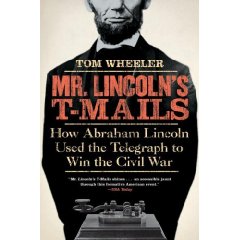I enjoyed all the comparisons between Barack Obama and Abraham Lincoln made at the Democratic National Convention this week. If anything, Lincoln was LESS experienced at the time of his election than Obama is now: Lincoln had only one 2-year term in the House of Representatives and was a complete dark horse candidate at the Republican convention in the summer of 1860 and a shock to the East Coast establishment when he got the nomination.
Get ready for a lot more Lincoln – next year is the bicentennial of his birth, and a nationwide commemoration of the 150th anniversary of the Civil War will also gear up next year. There’s going to be a lot of blue and gray around, and I’m preparing to do a comic entirely on Honest Abe!
As research for that, I just finished reading Tom Wheeler’s “Mr. Lincoln’s T-Mails.” Wheeler’s thesis is a fine one — that Abraham Lincoln’s use of the new technology of the telegraph mirrors our own experience with the new form of communication we call e-mail — but this book reads more like a long piece in the New Yorker than a book. He repeats his thesis over and over rather than to push his analysis into secondary or tertiary levels of description of how lightning-fast communication could be manipulated for the sender’s purpose. A decade into the e-mail practice, we all know now how e-mail can be used or NOT used to get a point across to friends, co-workers, bosses or others. There are glimmers of this kind of analysis in Wheeler’s book – such as when he notes Lincoln’s own perceptive view that a telegraph message ranked below a handwritten letter and far below face-to-face talking in its effectiveness. That hierarchy of human communication still exists today!
But more often Wheeler’s book is a simple review of the events of the Civil War. And a great reminder of what a jerk Union General George McClellan was! This is a fast read that could have moved a little more slowly than the speed of Morse code.
FUN PASSAGE:
“It might be argued that the telegraph’s intrusion had sapped (General) Hooker of his authority. Clearly he was frustrated, observing to a fellow general that dealing with Lee ‘had occupied two hours of his time each day, Washington had required the remainder.'”
Tags: Abraham Lincoln, Bentley Boyd, Chester the Crab, Civil War, history, telegraph
This entry was posted on Friday, August 29th, 2008 at 8:35 pm and is filed under Civil War, History Book Review. You can follow any responses to this entry through the RSS 2.0 feed. You can leave a response, or trackback from your own site.


















